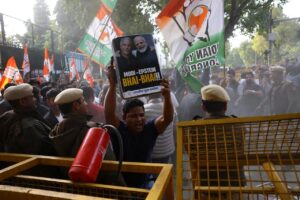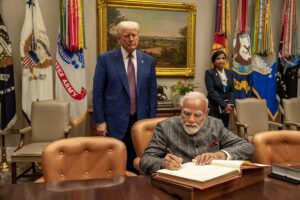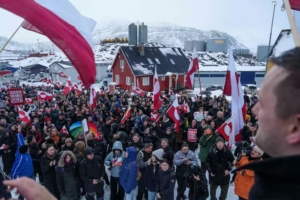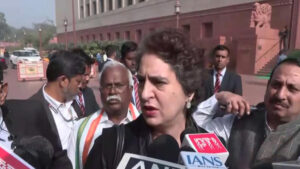This Is What Students Protesting Israel’s Gaza Siege Want

Toronto Metropolitan University students in Canada attend a protest against the school’s ties with Israel on April 30, 2024 (Mert Alper Dervis/Anadolu via Getty Images)
A wave of protests expressing solidarity with the Palestinian people is spreading across college and university campuses. There were more than 400 such demonstrations by the end of April 2024 just in the U.S., with many more in Canada and other countries.
The specific demands vary from place to place. What unites them is a call for schools to use their financial leverage and other kinds of influence to apply pressure on Israel.
The protesters are demanding divestment, meaning the sale of financial assets either related to Israeli companies or shares in other corporations perceived to assist the Israeli military. In addition, many protests include calls for the disclosure of those financial ties. They also feature demands for colleges and universities to distance themselves from Israel by ending study-abroad programs and academic exchanges.
The demands are mostly a response to Israel’s bombings and other military operations in Gaza that followed the Oct. 7, 2023, Hamas attack on Israel.
They also stem from broader concerns around Israel’s long-running blockade of Gaza and half-century of military occupation of the West Bank and Gaza. Both of those concerns have been behind the boycott, divestment and sanctions (BDS) movement for nearly 20 years.
I have spent decades teaching and researching Israeli-Palestinian relations and the global politics surrounding these issues. Along the way, I’ve learned that the discourse around the activism related to this Middle Eastern conflict is at least as relevant as the direct effects of the activism itself.
BDS Tactics
In 2005, 170 Palestinian civil society groups came together to initiate a call for boycott, divestment and sanctions. Many student organizations, academic associations and other kinds of groups later embraced the initiative.
BDS activists call for consumers around the world to boycott Israeli-made goods and refrain from spending money on Israeli movies, music and other cultural products. They discourage non-Israeli bands from performing in Israel and urge scholars and students not to study at or engage with Israeli academic institutions.
The movement also promotes divestment from holdings that support Israel’s military operations. And it seeks to impose sanctions, which could hypothetically include arms embargoes, asset freezes or trade barriers.
In other words, the U.S. government would have to participate for sanctions to work. Due to its close ties with the Israeli government, this is extremely unlikely. Nevertheless, the U.S. has recently sanctioned certain far-right Israeli entities.
U.S.-based BDS activists have, for this reason, focused on boycott and divestment rather than sanctions.
BDS Goals
Along with those tactics, BDS has three goals, or pillars. The first is ending Israel’s occupation of the West Bank and Gaza.
The second is dismantling the separation wall snaking through the West Bank.
The third is attaining full equality for Palestinian citizens of Israel and the right of Palestinian refugees to return to their ancestral towns and villages in historic Palestine. About 750,000 Palestinians fled or were forced to move to surrounding areas prior to and during the 1948 Arab-Israeli war.
Two-thirds of Gaza’s current residents are refugees and their descendants who were uprooted from their homes in 1948. This right to return is enshrined in international law.
While Israel has never let these Palestinian refugees return, it does maintain a “law of return” for Jews.
Response To BDS
BDS has caught on with many Palestinians and their supporters across the globe. But there’s been a concerted effort in Israel and the U.S. to legislate against it.
Israel has barred some BDS supporters, with Jews among them, from entering the country. And 38 U.S. states, as of 2024, have enacted anti-BDS legislation. Such laws require state contractors to pledge that they will not engage in BDS, or they require states to not invest funds in companies that support the movement’s goals.
To some Jews, boycotting Israeli products evokes the Nazi boycott of Jewish businesses in Germany in the 1930s. Other critics believe academic and cultural ties should never be restricted for any reason.
There are also BDS critics who find the tactics legitimate but object to one or more of the movement’s goals. The least controversial goal of the three pillars is full equality for Palestinian citizens of Israel. BDS critics almost never object to this goal. Instead, the debate occurs over the degree to which different people view Palestinian citizens of Israel as already possessing equality.
The second goal – ending Israel’s occupation – tends to be opposed primarily by right-wing supporters of Israel. These more conservative Israel supporters either believe that the occupation, including the security barrier that separates Palestinian residents of the West Bank from Israeli settlers and from Israeli residents in non-contested areas, is necessary for maintaining Israeli security – or that there is no occupation at all.
Other Israelis say that Israeli settlers deserve to live in all the lands of ancient Israel, including the West Bank.
Granting all Palestinian refugees the right to return is the most controversial BDS goal because of fears that Jews would perhaps become a minority of Israel’s citizens, causing the country to cease to be a Jewish state.
People with those concerns say making Jews a minority in Israel would be unjust and perhaps even an expression of antisemitism.
Another common concern regarding the BDS movement and the slightly different demands heard on campuses today has to do with the impression that Israel is being singled out for criticism when there are many other countries that commit human rights violations.
Modest Success Stories
The protests on college campuses in the spring of 2024, including those with prolonged encampments, have had, at best, modest success.
For example, Brown University protesters managed to persuade the administration to hold a vote on divesting from companies connected to the Israeli military. In return, the protesters agreed to dismantle their encampment.
Portland State University administrators agreed to pause its relationship with Boeing, which is a military contractor as well as a civilian aircraft manufacturer.
Perhaps most importantly, though, the protests have helped place Palestinian human rights demands squarely in the public eye.
(Published under Creative Commons from The Conversation. Read the original article here)





